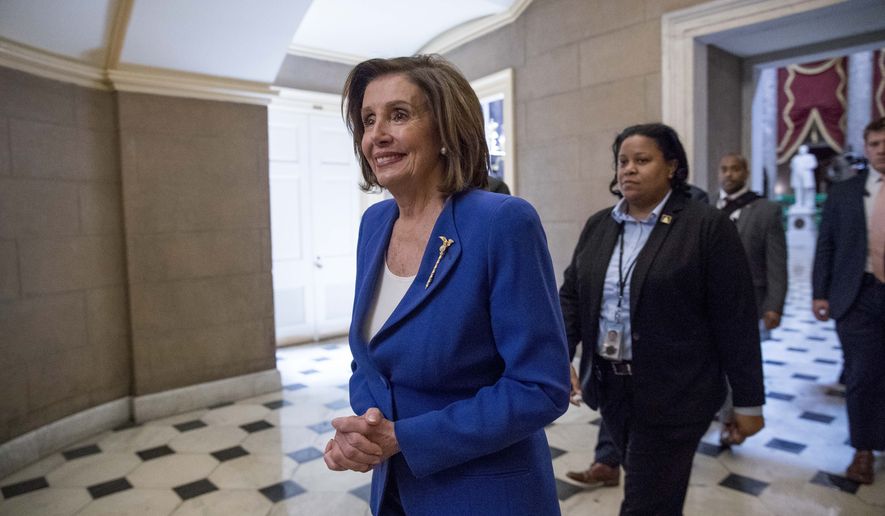With coronavirus keeping most of the country in self-isolation and raising concerns about returning to Capitol Hill, House leadership doubled down on opposition to lawmakers being allowed to vote remotely.
House Speaker Nancy Pelosi said there are too many constitutional and security concerns with the idea of remote voting. The idea has support from members in both parties, but leadership is looking into alternatives.
“As we all become more savvy in terms of technology one would say we can transfer that to remote voting but it’s not that easy,” she told reporters on a conference call. “There are some technologies that you might think would be workable — they might not be secure.”
“The rules are what they are now. If the rules need to be changed it needs to be done carefully. It took three years to change the rules after 9/11,” she added.
Since adjourning last month, members of Congress have been, like thousands of others across the country, working from home via conference calls and live video where necessary.
However, members continue to press for alternatives to voting in person. Many are doubtful they’ll be back on Capitol Hill by April 20, which both the Senate and House set as a tentative return date.
“Looking at it from a pure health care perspective, I can’t see a scenario where communities are lifting stay-at-home orders,” Democratic Rep. Ami Bera, a physician, told reporters this week. “I don’t want to make any predictions, but I think it would be unlikely that we’re returning April 20th.”
Similarly, Florida Republican Rep. Greg Steube suggested some lawmakers could be stuck even if Capitol Hill reopened its doors.
“Florida just issued a stay-at-home order for a month, so I won’t even be able to really legally leave without being in violation,” he told The Washington Times.
As of this week, more than 40 states, Puerto Rico and the District of Columbia have issued variations of shelter-in-place and stay-at-home orders — urging the public to stay inside as much as possible.
In some states, like Virginia, violations could mean a misdemeanor, however, the orders do allow for a wide range of essential exceptions, including traveling for work, school, grocery shopping or getting socially distant exercise.
According to The Hill, Sen. Roy Blunt, Missouri Republican, said he believed it was “unlikely” Congress would return but didn’t rule it out completely given that there may be issues lawmakers need to address by passing legislation.
Virginia, Maryland and Washington, D.C. — where most of the staffers and federal workers who help the Capitol function live — have all issued stay-at-home orders that extend beyond the House’s tentative return date.
Virginia’s goes until June 10 and D.C.’s until April 24. Maryland does not have a set end date.
Still, House and Senate leaders have not budged on April 20 — though Mrs. Pelosi said leadership is concerned about health risks.
“I’ll be very frank with you we don’t want anybody coming back at anytime that might not be healthy for them,” Mrs. Pelosi told reporters.
To vote in person, lawmakers — dozens of whom are elderly and at higher risk — would have to travel and gather together to cast their votes.
Both actions are actively discouraged by health officials.
Several lawmakers have tested positive for the virus or come down with symptoms since Congress passed the phase two coronavirus bill in early March.
Two members of the House — Reps. Ben McAdams, Utah Democrat, and Mario Diaz-Balart, Florida Republican — tested positive for coronavirus just days after voting on the crowded House floor for the phase two package.
Three days after a majority of House members scrambled to appear and pass the phase three package, Rep. Nydia Velazquez was diagnosed with ’presumed coronavirus’ and self-isolated.
Ahead of the Senate’s vote on the phase three package, Sen. Rand Paul, though asymptomatic, tested positive for coronavirus, prompting concerns of exposure amongst senators.
Sen. Mitt Romney went into self-quarantine and Sen. John Thune, the GOP Whip, actually flew home hours before the phase three vote because he starting to feel ill. Both tested negative for COVID-19.
Having members trying to legislate from across the country has forced the House to make adjustments to its procedures.
Mrs. Pelosi on Tuesday ordered House members to electronically submit all bills, resolutions, and official remarks that would typically be filed on the House floor.
She and Rules Committee Chairman Jim McGovern are weighing alternatives to voting in person, like voting by proxy.
In the meantime, leadership is trying to rely on voice voting and unanimous consent to pass must needed coronavirus legislation. If they do need to vote in person, leadership plans to stretch out the voting block to allow members to trickle in and social distance.
The difficult issue with that is such procedures can be easily blocked or derailed by only a handful of members.
On Thursday, Republican and Democrat senators both blocked opposing proposals under unanimous consent rules that would have added more funds to programs established under the last $2.2 trillion coronavirus package.
• Gabriella Muñoz can be reached at gmunoz@washingtontimes.com.




Please read our comment policy before commenting.